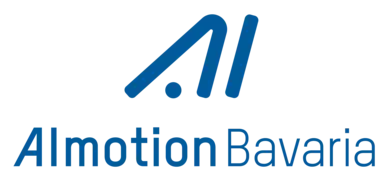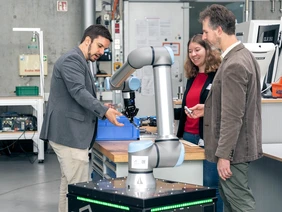A small robot whirs through the production hall between shelves. It grips, transports, and avoids obstacles efficiently and unspectacularly. That's exactly the idea. R10-D10 was presented at the AI forum ‘AI-supported production’ at BAI.CON 2025 in Ingolstadt: an autonomous helper that does its work quietly and fulfils a central promise of AI in the process. The robot is being developed at the AI mobility hub AImotion Bavaria at THI. Its concept is based on a real need: automating routine tasks without complex technology, difficult-to-operate systems, or costly maintenance. ‘It's not a show robot. We are building systems that really solve tasks, not just impress,’ emphasises Alexander Schiendorfer, research professor for AI-based optimisation in automotive production. The aim is for R10-D10 to be easily programmed by employees themselves and to learn from experience. ‘It is a kind of ‘Heinzelrobot’ that provides support where labour is lacking,’ says Schiendorfer. Ideally, it will fetch workpieces from the warehouse and perform other tasks on the way back - a building block for flexible, intelligent production processes. A key advantage: many of the components needed to realise the robot system are also used in the regional supplier industry. The proximity to the companies around the Ingolstadt automotive centre could accelerate development and practical transfer. The robot is trained in the production technology laboratory with the support of Jürgen Bock, Professor of AI Applications in Innovative Production and Logistics Systems, where it practises movement sequences, gripping techniques and navigation virtually on powerful simulation and AI computers. This virtual training saves resources and lowers the hurdles for use in medium-sized companies, for example. Young scientists are making an important contribution: Pauline Steffel, in particular, who is writing her doctoral thesis at THI's own PhD Centre for AI/Computer Science, is working on key issues relating to robot-based production processes. Together with student employees and students, she is researching how robots can acquire and store computerised knowledge about production systems and processes and use it to autonomously plan helpful tasks. R10-D10 is thus exemplary for a new generation of assistance systems: unagitated, efficient, practice-oriented. |


![[Translate to English:] Logo Akkreditierungsrat: Systemakkreditiert](/fileadmin/_processed_/2/8/csm_AR-Siegel_Systemakkreditierung_bc4ea3377d.webp)








![[Translate to English:] Logo IHK Ausbildungsbetrieb 2023](/fileadmin/_processed_/6/0/csm_IHK_Ausbildungsbetrieb_digital_2023_6850f47537.webp)


